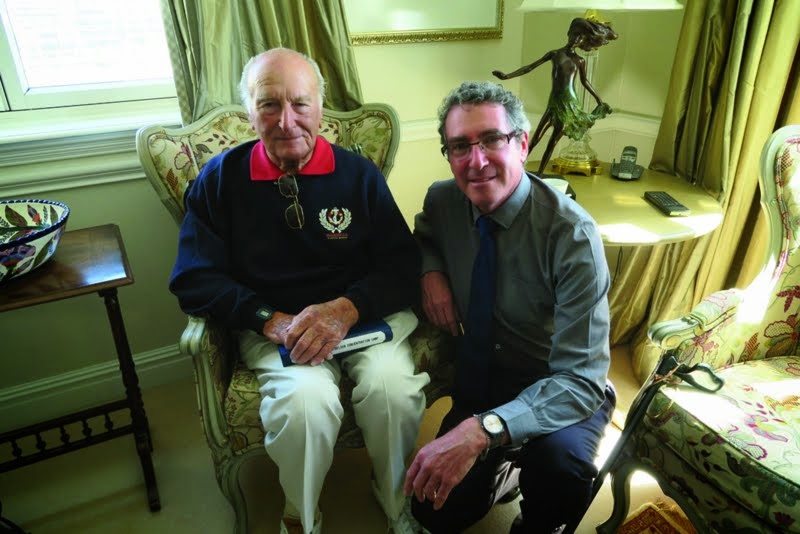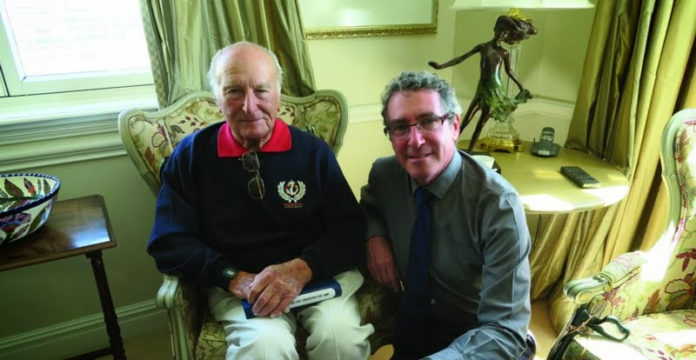 |
“It is not often that the liberators are asked to tell their stories, yet they are key witnesses to the horrors of the Holocaust,” said Richard Freedman (Director of the South African Holocaust & Genocide Foundation) upon meeting Leonard Berney, one of the British officers who liberated the Bergen-Belsen concentration camp in Germany in April 1945.
Mr Berney, who lives on the cruise ship ‘The World’, which recently docked in Cape Town, spent time speaking to members of the local press; sharing his story of being one of the first people to enter the camp 70 years ago.
It was in Bergen-Belsen that Anne Frank and her sister Margot perished just a few days before liberation. “She was one of 500 people who died there every day,” said Mr Berney. He explained that at the time, the prisoners had had no water or food for four or five days, and most were desperately ill with typhus, dysentery and tuberculosis.
He recalled: “I remember being completely shattered. There were dead bodies lying beside the road, emaciated prisoners still mostly behind barbed wire, open mass graves containing hundreds of corpses. The sights, the stench, the sheer horror of the place, were indescribable. None of us who entered the camp that day had any warning of what we were about to see or had ever experienced anything remotely like it before.”
In a written account of his experiences, he asked: “What should you do when faced with 60 000 dead, sick and dying people? We had no knowledge of dealing with a situation like this and we had been all more or less traumatised by the sights we had seen… Yet the major priority was to save lives.”
There were several immediate tasks, including providing water and food; burying the dead; evacuating the camp; hospitalising the sick; and rehabilitating and repatriating the prisoners. “We managed to do this in the face of such horrors because of our army discipline”, explained Mr Berney, who was a Staff Officer in the Anti-Aircraft Artillery (rank of Major). “We had to put aside what we felt and get on with it.”
He described how the British Army was quickly able to establish a water supply, and that they discovered stores of food nearby – demonstrating that it could have been possible for the Nazis to provide food and water at Bergen-Belsen. “Although it was not a death camp, hundreds of people died every day due to deliberate starvation, slave labour and allowing disease to run rampant,” he said.
These nearby food stores were in barracks that also had dormitories, kitchen facilities and a hospital; all these were converted into a Displaced Persons (DP) camp, of which Berney was in charge. “In just six days the hospital was ready to receive its first patients from the concentration camp. Eventually the hospital had 15,000 beds and patients – the largest hospital in the world, before or since!”
Mr Berney explained how after a few weeks with decent meals, separate beds, proper washing and sanitary facilities, “the physical recovery of the previously emaciated and dehumanised inmates took place with remarkable speed. We started to receive gift parcels from many countries, mostly food and clothing. One crate we received contained hundreds of lipsticks! I remember remarking at the time, of all the essentials the camp inmates need, lipstick isn’t one. I was wrong – those lipsticks probably did more to recover the self-esteem of the younger women than anything else could have done!”
The former Major told how “As the weeks went on and it became clear that no country would offer asylum. The inmates were asking, ‘What is to happen to us?’ Many became desperate and believed that their only salvation was to make their way to Palestine. Every day or two, groups of between 20 to 50 people would leave for that 2,000 mile long and perilous journey. I would see to it that they were well supplied with food and water and that they knew the locations of other DP camps along their route to the Mediterranean,” he said.
Mr Berney supervised the DP camp for a number of months, and after the war he returned to Britain. He started sharing his wartime experiences about 10 years ago, when he noticed an increase in Holocaust denialism. “How can they say it didn’t happen? I was there!”
Mr Berney’s message is that “the same thing can happen again if you let it happen.” He emphasised that we must be vigilant in the face of dictatorships, and keep trying to prevent prejudice, oppression and the genocides that plague our world.











